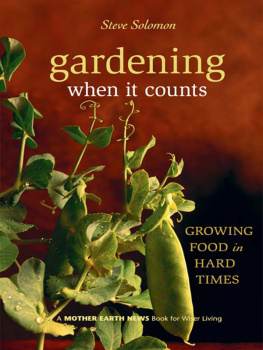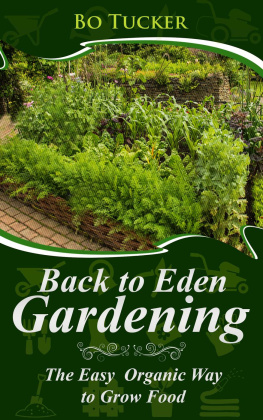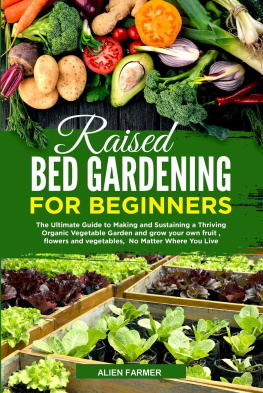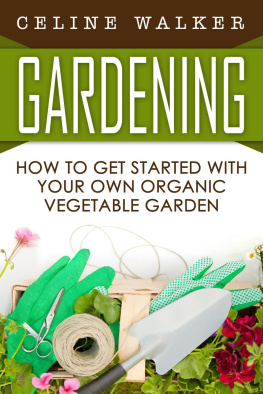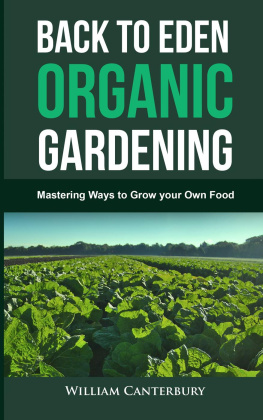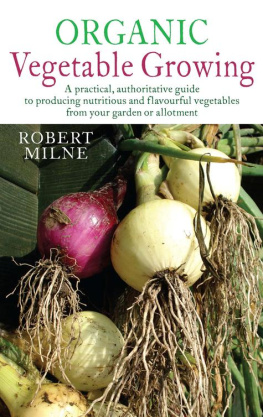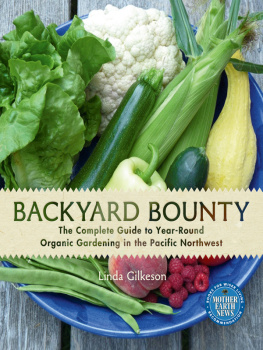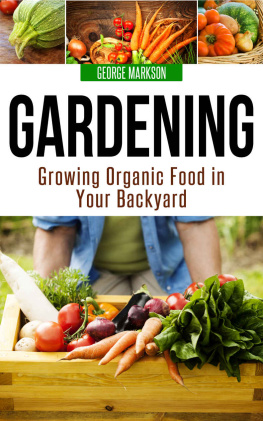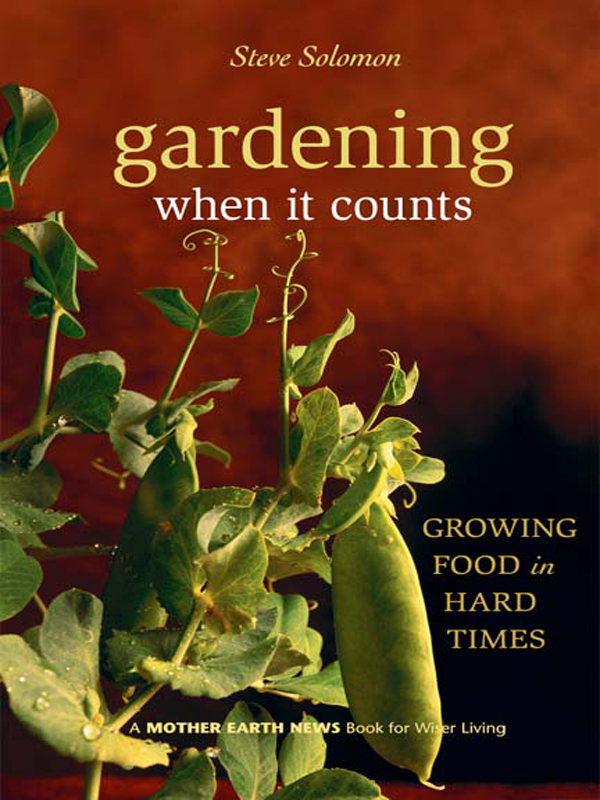
Advance Praise
Gardening When it Counts
I recommend Gardening When It Counts as an excellent first book for thebeginning gardener. It includes all the practical details necessary to make,prepare, and tend a garden, make compost, choose varieties and seeds, andto grow just about everything. I also recommend it to all experiencedgardeners. It is guaranteed to change the way you view and do gardening.Gardening When it Counts is a magnificent synthesis of garden science,original garden research, and agricultural history.
Carol Deppe, Ph.D., author of Breed Your Own Vegetable Varieties:The Gardeners and Farmers Guide to Plant Breeding and Seed Saving.
In Gardening When it Counts, Steve Solomon prepares the groundby encouraging us to embrace the organic revolution by growing morefood with fewer imported resources and more ingenuity. He providesa hands-on account of amendment-centered gardening, using a widevariety of sources, and exhorts us to save seeds of kinds and varietiesthat we like to eat, that do well for us, and that may be droppedfrom current commercial seed inventories.
Alan M. Kapuler, Ph.D., President, Peace Seeds,and former Research Director and cofounder of Seeds of Change
Steve Solomons book is delightfully informative and abundantly richwith humor and grandfatherly wisdom. A must-read for anyonewanting a feast off the land of their own making ....
Elaine Smitha, host of Evolving Ideas radio and telvision, and author ofIf You Make The Rules, How Come You're Not Boss?
Books for Wiser Living from
Mother Earth News
T oday, more than ever beofre, our society is seeking ways to live more conscientiously. To help bring you the very best inspiration and informatin about greener, more sustainable lifestyles, New Society Publishers has joined forces with Mother Earth News. For more than 30 years,Mother Earth News has been North America's "Original Guide to Living Wisely," creating books and magazines for people with a passion for self-reliance and a desire to live in harmony with nature. Across the countryside and in our cities, New Society Publishers and Mother Earth News are leading the way to a wiser,more sustainable world.
Steve Solomon
gardening
when it counts
GROWING
FOOD in
HARD
TIMES

NEW SOCIETY PUBLISHERS
Cataloging in Publication Data:
A catalog record for this publication is available from the National Library of
Canada.
Copyright 2005 by Steve Solomon.
All rights reserved.
Cover design by Diane McIntosh. Photo: .
All illustrations by Muriel Chen unless otherwise credited.
Printed in Canada.
First printing December 2005.
Paperback ISBN-10: 0-86571-533-X
Paperback ISBN-13: 978-0-86571-533-0
Inquiries regarding requests to reprint all or part of Gardening When it Counts
should be addressed to New Society Publishers at the address below.
To order directly from the publishers, please call toll-free (North America)
1-800-567-6772, or order online at www.newsociety.com
Any other inquiries can be directed by mail to:
New Society Publishers
P.O. Box 189, Gabriola Island, BC V0R 1X0, Canada
1-800-567-6772
New Society Publishers' mission is to publish books that contribute in fundamental ways to building an ecologically sustainable and just society, and to do so with the least possible impact on the environment, in a manner that models this vision.We are committed to doing this not just through education, but through action.We are acting on our commitment to the world's remaining ancient forests by phasing out our paper supply from ancient forests worldwide. This book is one step toward ending global deforestation and climate change. It is printed on acid-free paper that is 100% old growth forest-free (100% post-consumer recycled), processed chlorine free, and printed with vegetable-based, low-VOC inks. For further information, or to browse our full list of books and purchase securely, visit our website at: www.newsociety.com
NEW SOCIETY PUBLISHERS www.newsociety.com
Dedication
S ince the time I was sent to elementary school, my feet have marched to the beat of a different drummer than Everybody Elses.The difference caused me much grief as a child; much success as an adult.
This book is for Mr. and Ms. Everybody Else, who are well known and highly respected authorities on most everything, including vegetable gardening. Most people look to Everybody Else for guidance before making any decision. It has long been my experience that Everybody Else is usually wrong and deeply needs the information in this book.
Contents
CHAPTER
Introduction
D uring the 1970s, inflation and unemployment were high. In such lean years, many people grow substantial backyard veggie gardens. I was a young man who did that.
Good times returned in the 1980s and continued into the first half of the first decade of the new millennium fat years. I was there. In easy times people go to restaurants and take summer vacations; not me, I continued gardening.
Now I am 63 years old, still flexible enough to touch my toes (on a good day), still able to put in a hard mornings work, still growing the majority of what we eat in our household, still doing it 12 months a year.These days I feel fortunate to have retired to one of the worlds most remote places, Tasmania, a temperate South Pacific island with a climate that is a lot like Oregons. From here I can enjoy a slight sense of detachment as I watch how the planet is going. But Tasmania is not self-sufficient, so I am not nearly as detached as I wish I could be about the hard times I foresee coming. I have the feeling that I should share some gardening knowledge Ive accumulated with those who are probably soon going to need it, which is why I wrote this book.
During the fat years, an unfortunate change happened in veggie gardening. Books and magazine articles promoting traditional homestead and backyard methods growing well-separated plants in rows far enough apart that you could walk between them disappeared. Row gardening was universally denounced as a waste of space, inefficient with water, and low-producing. Densely packed, deeply dug, super-fertile, massively irrigated, raised-bed systems became fashionable. As I write this book in 2005, intensive gardening still reigns.
When I started suburban backyard food gardening, John Jeavons was just starting to write about intensive gardening, and that was the method I used. Five years later I became a back-to-the-lander and continued to garden intensively even though I had a five-acre (two-hectare) homestead and could have spread my plots out as widely as I wished. In 1979 I created Territorial Seed Company, a homestead-based mail-order vegetable-garden seed business, and by 1984 I had written three gardening books recommending intensive methods.
During the 1980s, when intensive had become standard practice, several things came together to teach me it was not the best way. Because I was running a seed company, I had to do variety trials.What are variety trials, you ask? Well, an honest seed business does not sell just any old variety of seed that has been recommended by Someone Else. You decide for yourself what to sell after testing numerous varieties.Trials require that you grow plants far enough apart that each can develop to its full potential. One thing I noticed from doing this was that my trial plots didnt need nearly as much irrigation as my intensive veggie garden. Another was that these well-separated plants got much larger; they tasted better than crowded vegetables did when they werent harvested promptly; and many vegetable species grown that way yielded more in relation to the space occupied, not less as I had read in books by intensivist gurus.
Next page
